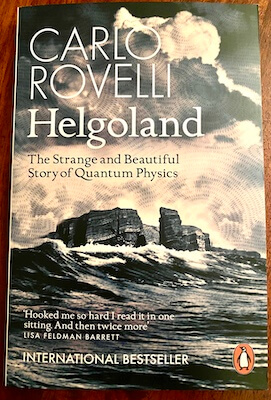
Buy the damn book
Have lots of interesting books around. To help with this: always buy the book. In the scheme of things, books cost nothing. The equivalent of a couple of pints. Less than a pizza.
If you’re broke and can’t afford books, you’ll know. If you’re feeling like ‘hmm, I’m not sure whether I should or not…’ Yes, you should. Buy the damn book.
My sense is that we prevaricate about buying books, not because of the cost, but because the feeling of having ‘too many’ unread books around weighs on us in some way.
This is one of the page-long chapters in Nick Parker’s “On Reading”, a book that changed my relationship with books and reading, as I wrote about in: “The unit of reading is a chapter“.
This week I had a few minutes free before a lunch meeting. I spotted a bookshop and walked in. Soon I spotted a (typically for the author) slim volume by Carlo Rovelli (see the post “We inhabit time as fish live in water“), so I bought the book, Helgoland.
Being a slim volume that I know will be full of exquisite writing, this book will go in my backpack, to pick out and read on a train or aircraft journey, maybe for a few pages at a time, maybe from cover to cover. Who knows. As Nick goes on to say, have piles of books:
Have lots of books on the go. How many? How many places can you get away with making small piles of books?: one pile by the bed, another on the desk, a book or two in my rucksack, a small stack by the comfy chair…
As I write this, I have this new book in my backpack, around 12 books on the table by my comfy chair, and three books on my desk by my monitor.
So, buy the damn book, and have piles of books around your home.
Oh. and if you are considering buying this particular book too (on the origins of quantum physics), then consider this quote from Rovelli on the mystery and majesty of the universe and our place as humans within it: The further we study any form of science (for me that is Economics, Mathematics, Physics), the more beautiful they become as we recognise we have some of the answers, but not all, so science becomes about our relationship to it, in all our human confusion:
The search for knowledge is not nourished by certainty: it is nourished by a radical absence of certainty.
